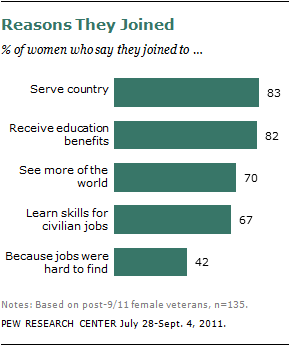 The following attitudinal analyses come from a nationally-representative Pew Research survey of 1,853 military veterans, including 712 veterans who served in the period after Sept. 11, 2001. The survey was conducted from mid- to late-summer 2011. Among this sample of veterans, 135 female post-9/11 veterans were surveyed. Though caution should be taken in analyzing such a small sample, all differences reported are statistically significant.
The following attitudinal analyses come from a nationally-representative Pew Research survey of 1,853 military veterans, including 712 veterans who served in the period after Sept. 11, 2001. The survey was conducted from mid- to late-summer 2011. Among this sample of veterans, 135 female post-9/11 veterans were surveyed. Though caution should be taken in analyzing such a small sample, all differences reported are statistically significant.
Why They Joined
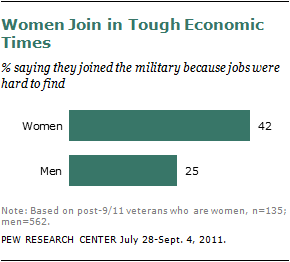 What compels young American women to join the armed forces? The answer is, to a large extent, the same things that compel young American men to join. In almost all aspects surveyed, the women’s reasons for joining the military were not significantly different from the men’s reasons.
What compels young American women to join the armed forces? The answer is, to a large extent, the same things that compel young American men to join. In almost all aspects surveyed, the women’s reasons for joining the military were not significantly different from the men’s reasons.
More than eight-in-ten post-9/11 female veterans say they joined to serve their country or receive education benefits (83% and 82%, respectively). Fully 70% say they joined to see more of the world and almost as many (67%) say they joined to gain job skills.
However, there is one key difference in the reasons that men and women joined the military. Some 42% of female veterans say they joined the military because jobs were hard to find, compared with one-quarter of men.
Returning from the Wars
Many of the experiences of female veterans from the post-9/11 military differ from those of men – they are less likely to have served in combat (30% vs. 57% of men)1, more likely to have never been deployed away from their permanent duty station (30% vs. 12% of men) and less likely to have served with someone who was killed while performing their duties in the military (35% vs. 50% of men).
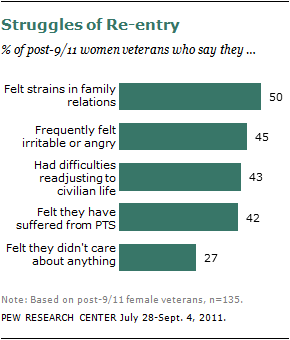 At the same time, however, they are equally likely to have had emotionally traumatic or distressing experiences while serving (47% vs. 42% of men), and their transition back into civilian life has been equally tough. More than four-in-ten female post-9/11 veterans (43%) say their readjustment to civilian life after their military service was very or somewhat difficult (along with 45% of men).
At the same time, however, they are equally likely to have had emotionally traumatic or distressing experiences while serving (47% vs. 42% of men), and their transition back into civilian life has been equally tough. More than four-in-ten female post-9/11 veterans (43%) say their readjustment to civilian life after their military service was very or somewhat difficult (along with 45% of men).
Furthermore, women are about as likely as men to report that they feel they have suffered from post-traumatic stress (42% vs. 35% of men), that they have frequently felt irritable or angry (45% vs. 47%), and that they have felt they didn’t care about anything (27% vs. 33%) since they left the service. They are also as likely as men to say they have experienced strains in their family relationships since their discharge from the military (50% vs. 48%).
Female veterans are also just as likely as their male counterparts to say they have experienced the positive benefits of military service. Fully 80% of women say they have appreciated life more since they were discharged from the service (83% of men say this). In addition, 97% say they feel proud of their service and 91% have had someone thank them for their military service (compared with 96% and 92% of men, respectively).
Female veterans and male veterans are equally likely to feel their military experience has paid off for them personally and professionally. Some 79% of women veterans say their military experience has helped them get ahead in life and nearly three-quarters (74%) feel the military was useful in terms of preparing them for a job or career (as do 73% and 71% of men, respectively).
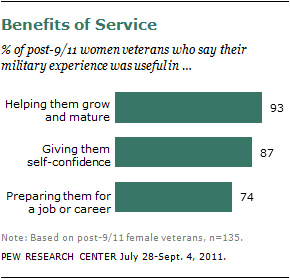 In addition to seeing it as a learning experience, female veterans see their service as a time of self-development. Fully 93% of women say their military experience was useful in helping them grow and mature as a person (along with the same share of men), and 87% of women say their military experience was useful in building their self-confidence, as do 91% of men.
In addition to seeing it as a learning experience, female veterans see their service as a time of self-development. Fully 93% of women say their military experience was useful in helping them grow and mature as a person (along with the same share of men), and 87% of women say their military experience was useful in building their self-confidence, as do 91% of men.
More than three-quarters (78%) of women veterans say they would advise a young person close to them to join the military. This is similar to the share of men who would advise this (82%).
Views on the Wars
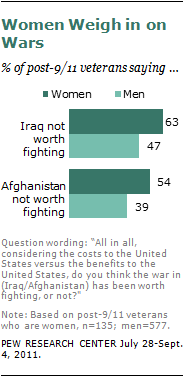 Yet while they’re proud and thankful of their service, post-9/11 women veterans are critical of the wars in Iraq and Afghanistan. When asked whether they thought the wars in
Yet while they’re proud and thankful of their service, post-9/11 women veterans are critical of the wars in Iraq and Afghanistan. When asked whether they thought the wars in
Iraq and Afghanistan have been “worth fighting,” 63% of female veterans say that the war in Iraq was not worth fighting and 54% say the same of the war in Afghanistan.
Here, the views of military women differ from their male counterparts. Among male veterans, less than half (47%) were critical of the Iraq war and only 39% were critical of the war in Afghanistan.
This gender gap is not as apparent among the general public. In a Pew Research survey conducted Sept. 1-15, 2011, men and women as a whole expressed similar views about the wars in Iraq and Afghanistan, with narrow majorities of both saying the wars were not worth fighting.


